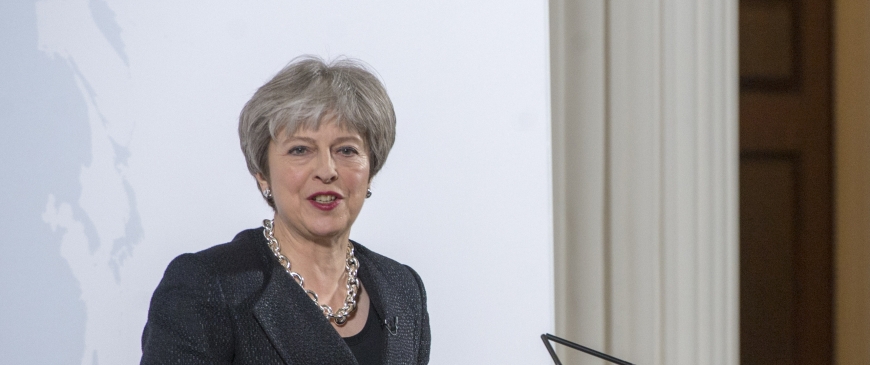
Europe's response to May's plan could cost her more ministers
The EU’s initial reaction to the Chequers plan is polite, but negative. The prime minister will have to make further concessions before it is accepted.
The EU is shedding few tears over the departures of the Brexit secretary, David Davis, and the foreign secretary, Boris Johnson. The European commission’s chief Brexit negotiator, Michel Barnier, found Davis’s bluffness and tendency to skate over details irritating. Many EU ministers despised Johnson, viewing him as a self-obsessed showman whose dishonesty had helped to deliver Brexit.
The EU has long considered Theresa May’s key Brexit official, Olly Robbins, as her main representative – Davis had spent only four hours with Barnier since the start of this year. The commission had become increasingly frustrated with May’s inability to define a UK plan and to take on the hard-Brexit ministers. Now the Chequers agreement and the cabinet resignations show that she has found some mettle.
This has boosted her credibility with the EU, which is fortunate, because its initial reaction to the Chequers plan, though polite, is negative. It views the “facilitated customs arrangement” (FCA) – the complex, hi-tech scheme for the UK to collect customs dues on behalf of the EU – as unworkable. It would have helped if May had spelt out what must be her intention, which is to keep the UK in a customs union until the FCA works (if it ever does). More importantly, the EU dislikes the idea of the British staying in the single market for goods, even though they would be “rule-takers” – signing up not only to current rules but also to future laws, without having a vote on them.
May’s point is that the single market for goods would – if combined with satisfactory customs and VAT arrangements – obviate the need for checks on the intra-Irish border, as well as avoid disruption of manufacturing supply chains. Service companies would have to cope with poorer access to EU markets, but she thinks the UK financial services industry is too big and important to be a rule-taker. May is probably right to believe that her plan is the least-bad model for the UK economy that might work politically.
But she will struggle to persuade the EU to grant free movement of goods without the UK also signing up to the remaining “four freedoms” – of services, capital and labour. EU leaders consider the four freedoms indivisible: if the UK could “cherrypick” parts of the single market without accepting free movement of people, other states, inside or outside the EU, could ask for similar deals. And that would undermine the strength and cohesion of the EU’s institutions.
The EU worries that the UK is asking for something close to the Swiss model. Switzerland is in the single market for goods, but not services – which Brussels dislikes because the European court of justice cannot enforce the rulebook on the Swiss.
Commission officials add that these days, goods and services cannot be disentangled; much of the value of a good comes from related services (such as the design, marketing and financing of a car). And if the UK were free to undercut EU standards on services, it could distort the level playing field for goods. But the Chequers plan seeks to meet concerns about the playing field by promising to maintain EU social, environmental and consumer standards and to respect its state aid rules.
Some continental companies, such as those making cars and aeroplanes, are more open to the UK plan than the commission. So are some governments, including those in central Europe that fear the geostrategic consequences of a Europe weakened by a hard Brexit. Yet so far there is little evidence of Britain’s friends seeking to soften the hard line set by the commission and many member states. Indeed in the commission and in Paris some officials say that they are relaxed about the prospect of a no-deal Brexit, believing the costs acceptable.
May’s strongest argument is that only her plan can ensure there is no hard border between the two parts of Ireland. The commission’s line is that a Canada-style free trade agreement for the UK, combined with Northern Ireland staying in a customs and regulatory union with the EU, would deliver the same outcome. But May and many other British politicians believe that that scheme, involving checks on goods crossing the Irish Sea, would challenge the UK’s constitutional integrity.
Barnier says that if the UK’s red lines alter, the EU’s offer could change. But May would have to make substantial concessions before the Chequers plan became viable. She would need to commit to a customs union until some hi-tech alternative became viable. And she would have to accept a stringent mechanism for following new EU rules and a significant role for the European court.
May has indicated flexibility on all three points. But she would find it harder to cede on payments to the EU and free movement of labour (both of which Norway and Switzerland accept as the price for market access). There are probably ways of fudging the money issue, but free movement will be much harder. The EU shows no signs of wanting to restrict free movement of workers within its single market.
And May’s dilemma is that the paler her red lines become, the greater the risk of losing more ministers.
Charles Grant is director of the Centre for European Reform.
